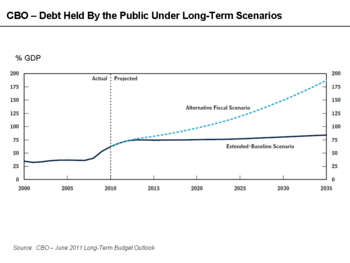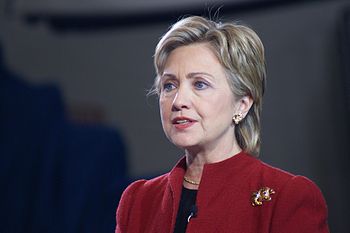If American politicians lived in the real world, US president Barack Obama would propose and Congress would pass a balanced budget for the federal government.
But American politicians don’t live in the real world. Since World War II they’ve inhabited a utopian fantasy in which the federal government has continuously spent more money than it has brought in, on the promise that that debt will eventually be paid off.
Someday.
By someone.
So we’ve once again reached the periodic moment of untruth, with a September 30th deadline for Congress to decide between three alternatives:
Obama’s completely insane budget proposal (which increases spending across the board on both the military and civilian sides of government); or
One of several equally crazy Republican budget proposals (which would likely increase military spending and make some cosmetic cuts to civilian spending); or
Another fake “government shutdown,” accompanied by automatic “sequestration” entailing trivial cuts in both areas.
Under each of these alternatives, the federal government will run a deficit (in English, it will kite a check and overdraw its accounts), adding half a trillion dollars or so to the federal government’s debt (euphemistically referred to as the “national debt” or “public debt” — the politicians want to keep you believing that you’re responsible for their fiscal irresponsibility, and their creditors believing that you’ll cough up someday).
The best choice — in fact, the only reasonable choice — would be for the president and Congress to bite the bullet and balance the budget. That is, make a reasonable estimate of revenues and craft a budget that appropriates and spends less than that estimate.
But, like I said, reasonable is off the table. Neither the president nor Congress is willing to balance the budget this year, or to commit to doing so for any year in the near future. So it looks sequestration is the best we can hope for right now.
How about the next crop of politicians?
American voters will elect a new president, replace (or re-elect) the entire House of Representatives, and replace (or re-elect) 1/3 of the US Senate next year, to take power in January of 2017.
Many of the campaigns are already under way, and the presidential candidates are already debating each other in public.
Why not hold their feet to the fire, and let them know that any candidate who proposes to continue deficit spending will not receive your vote?
Thomas L. Knapp is director and senior news analyst at the William Lloyd Garrison Center for Libertarian Advocacy Journalism (thegarrisoncenter.org). He lives and works in north central Florida.
PUBLICATION/CITATION HISTORY
- “More Sequestration: The Best Bad Thing, For Now,” by Thomas L. Knapp, Ventura County, California Citizens Journal, 09/08/15
- “More sequestration: The best bad thing, for now,” by Thomas L. Knapp, Davenport, Iowa Quad-City Times, 09/10/15
- “More sequestration: The best bad thing, for now,” by Thomas L. Knapp, Muscatine, Iowa Journal, 09/10/15
- “More sequestration: The best bad thing, for now,” by Thomas L. Knapp, Sonoran News [Arizona], 09/16/15



